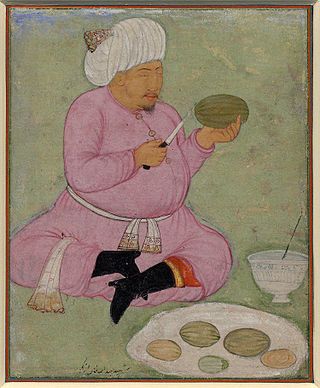
Tashkent, also known as Toshkent, is the capital and largest city of Uzbekistan. It is the most populous city in Central Asia, with a population of more than 3 million people as of April 1st 2024. It is located in northeastern Uzbekistan, near the border with Kazakhstan.

The Khanate of Sibir was a state in western Siberia. It was founded at the end of the 15th century, following the break-up of the Golden Horde. Throughout its history, members of the Shaybanid and Taibugid dynasties often contested the rulership over the Khanate between each other; both of these competing tribes were direct patrilineal descendants of Genghis Khan through his eldest son Jochi and Jochi's fifth son Shayban (Shiban). The area of the Khanate had once formed an integral part of the Mongol Empire, and later came under the control of the White Horde and the Golden Horde of 1242–1502.

Muhammad Shaybani Khan was an Uzbek leader who consolidated various Uzbek tribes and laid the foundations for their ascendance in Transoxiana and the establishment of the Khanate of Bukhara. He was a Shaybanid or descendant of Shiban, the fifth son of Jochi, Genghis Khan's eldest son. He was the son of Shah-Budag, thus a grandson of the Uzbek conqueror Abu'l-Khayr Khan.

Abdullah Khan, known as "The Old Khan", was an Uzbek ruler of the Khanate of Bukhara (1500–1785). He was the last uncontested Shaybanid Khan of Bukhara from 1583 until his death.

The Uzbek Khanate, also known as the Abulkhair Khanate, was a Uzbek Shaybanid state preceding the Khanate of Bukhara. During the few years it existed, the Uzbek Khanate was the preeminent state in Central Asia, ruling over most of modern-day Uzbekistan, much of Kazakhstan and Turkmenistan, and parts of southern Russia. This is the first state of the Abulkhairids, a branch of the Shaybanids.

The Khanate of Bukhara was an Uzbek state in Central Asia from 1501 to 1785, founded by the Abu'l-Khayrid dynasty, a branch of the Shaybanids. From 1533 to 1540, Bukhara briefly became its capital during the reign of Ubaidullah Khan. The Khanate reached its greatest extent and influence under its penultimate Abu'l-Khayrid ruler, the scholarly Abdullah Khan II.

The Kazakh Khanate, in eastern sources known as Ulus of the Kazakhs, Ulus of Jochi, Yurt of Urus, was a Kazakh state in Central Asia, successor of the Golden Horde existing from the 15th to the 19th century, centered on the eastern parts of the Desht-i Qipchaq.

The Shibanids or Shaybanids, more accurately known as the Abul-Khayrid-Shibanids, were a dynasty of Turko-Mongol origin who ruled over most of modern-day Kazakhstan, Uzbekistan, and parts of Russia in the 15th century. They were the patrilineal descendants of Shiban, the fifth son of Jochi and grandson of Genghis Khan. Until the mid-14th century, they acknowledged the authority of the descendants of Shiban's brothers Batu Khan and Orda Khan, such as Öz Beg Khan. The Shaybanids originally led the Gray Horde southeast of the Urals, and converted to Islam in 1282. At its height, the Khanate included parts of modern-day Afghanistan and other parts of Central Asia.

Abu'l-Khayr Khan, also known as Bulgar Khan, was Khan of the Uzbek Khanate from 1428 to 1468, which united the nomadic Central Asian tribes.
The Kazakh War of Independence (1468–1500) was a conflict fought in Central Asia between the Kazakh Khanate and the Uzbek Khanate, which attempted to maintain its control over most of modern-day Kazakhstan, which at the time was under Uzbek rule. The war started after Abu'l-Khayr, Khan of the Uzbek Khanate, attacked Zhetysu in 1468 which was controlled by a small band of rebel Kazakhs who had split from the original Uzbek Khanate. Abu’l Khayr did so in an attempt to prevent the growing Kazakh influence among the steppe. However, he died unknowingly, making it easier for the Kazakhs to expand their influence. After Abu'l-Khayr Khan's death, the Uzbeks continued to be ruled by the Shaybanids who fought against the Kazakhs in the cities that were on the Syr Darya until both sides agreed to peace in 1500 with the Kazakh Khanate gaining its sovereignty from the Uzbek control. At the end of the war, the Uzbek Khanate transferred most of Kazakhstan to the Kazakh Khanate.
Kazakh invasion of Northern Bukhara also known as a Kazakh invasion of Mā Warāʾ an-Nahr was a military campaign of the Kazakh Khanate led by Tawakkul Khan against the Khanate of Bukhara in 1598 and 1599.
The Janids or Astrakhanids were a Muslim dynasty in Central Asia. They ruled the Khanate of Bukhara from 1599 to 1785.
Battle of Samarkand — the battle of 1613 between the Kazakh Khanate and the Bukhara Khanate in the Samarkand region.
Kazakh-Nogai War — the armed conflict of the Kazakh Khanate and the Nogai Horde from 1515 to 1521. Which ended with the victory of the Kazakhs.
The Kazakh-Tashkent War was a conflict in the first half of the XVI century between the Kazakh Khanate and the Bukhara Khanate, where the Kazakhs fought with Tashkent in 1534.
Kazakh-Nogai War (1508) — armed campaign of the Kazakh Khanate against the Nogai Horde
Kazakh-Nogai War (1577) — one of the major military invasions of the Kazakh Khanate on the territory of the Nogai Horde.
In the Battle of Emba in 1570, Haqnazar Khan defeated the Nogai who lived near Emba.
The Kazakh-Nogai War (1535-1537) was a multilateral armed conflict in Central Asia, resulting in a crushing defeat for the Kazakh Khanate.








